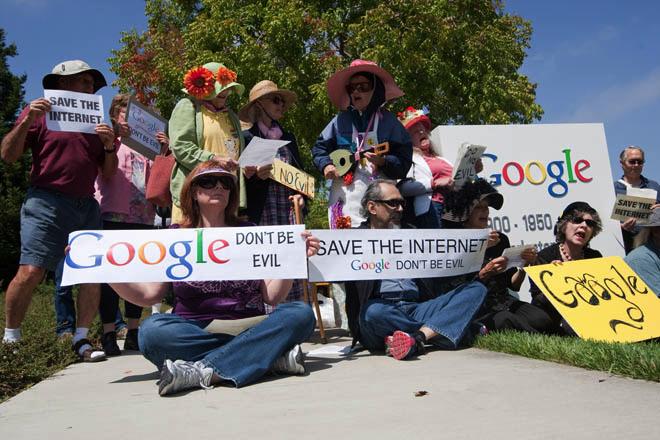Why You Shouldn't Fear Google & Verizon's Net Neutrality Deal
 For all of the angst, the Google-Verizon net neutrality framework announced last week would keep the internet operating pretty much the same way it does today.
For all of the angst, the Google-Verizon net neutrality framework announced last week would keep the internet operating pretty much the same way it does today.
"Breaking up is hard to do. If he didn’t know it before, Google CEO Eric Schmidt has realized it now. After pushing the "net neutrality" issue and promoting many of the main net neutrality advocates for years, Google had built a tiger they could not get off very easily. So when Google and Verizon announced that they could agree on what a net neutrality policy framework might look like, the professional left-wing tiger that Google had helped to build... did what a tiger - or the Professional Left - does.
 The elusive North American Professional Lefty Tiger. Their pre-printed, multi-color plumage is completely organic and not at all manufactured. Photo via Wired.com and photographer Stefan Armijo
The elusive North American Professional Lefty Tiger. Their pre-printed, multi-color plumage is completely organic and not at all manufactured. Photo via Wired.com and photographer Stefan Armijo
They (Moveon.org, Free Press, Color of Change, Progressive Change Campaign Committee and CREDO Action) used a petition to build up their email list and staged a small protest at Google HQ.
For all of the angst, if the Google-Verizon net neutrality framework announced last week were adopted word for word, the Internet would keep operating pretty much the same way it is today. The announcement is significant – not because it will change the Internet substantively – but because it signals that we are moving toward a reasonable resolution that might not freeze the Internet in place, under telephone regulations, that would bar much of the useful innovation that networks could do. In the process, Eric Schmidt and his fellow Googlers reinforced something that Google Telecom and Media Policy Counsel Rick Whitt said in 2009:
The first principle really should be for the policymaker to take great caution. To tinker, not tamper. ... [P]olicymakers have been ill-equipped to deal with the numerous issues stemming from convergence and the value shifts in these complex markets. [...] [I]t really is about the outcome – it’s the environment we want, and not necessarily the path. There are many ways to get there, this may be one of them, frankly. Or other ways like self-regulating organizations, standards, bodies and the like.
At this point, every significant member of the Internet ecosystem, every network operator, every cable company, and every one of the old phone companies are now fully and publicly committed to the basic principles of net neutrality. Whether or not it was plausible four years ago, blocking and degrading service is clearly beyond the pale today, and pretty much everybody is onboard with new transparency standards for network operators about their services and network management practices.
There have been two major areas of criticism of the Verizon/Google policy recommendation.
- Managed Services: Google and other net neutrality backers such as Amazon now acknowledge that ISP's should be able to offer some specialized Internet services to content providers and individual consumers – providing those services don’t hurt other consumers or block competition. And why not? If it neither picks your pocket, nor breaks your leg, the government shouldn't tell you that you can't buy it.
- Wireless: Critics have complained that Google caved by suggesting those networks are exempt from net neutrality rules - though, it's worth noting that Google and Verizon also proposed that the GAO "would report to Congress annually on the continued development and robustness of wireless broadband Internet access service." But, as Eric Schmidt noted - and the FCC Chairman Julius Genachowski has acknowledged - the limited wireless spectrum presents unique challenges that cannot be wished away by regulatory fiat (not without significant unintended consequences, anyway). And the wireless market is substantively more competitive. Has Google’s view on this issue changed over the past few years? Of course, it has – that’s what happens when smart groups get more deeply involved in policy. They learn that it's more complicated than it first seemed from afar.
Finally, there’s this – the Google-Verizon framework is just one proposal for what a net neutrality framework might look like. After years of "net neutrality" being a vague term that generally just meant "Good Things" where "good" and "things" were terms to be defined later, this is, finally, a plausible proposal for what the policy may look like.

